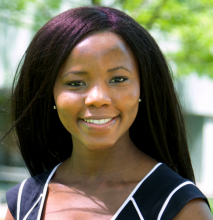BME Seminar Series (Zoom): Isogenic Organs-on-chips for Human Disease Modeling and Therapeutic Discovery

Assistant Professor
Department of Biomedical Engineering
Duke University
Musah Lab
Zoom: https://uci.zoom.us/s/97629106431 Password: 198Sem
Abstract: The Musah Lab aims to understand how molecular and biophysical cues can function either synergistically or independently to guide organ development and function, and how these processes can be therapeutically harnessed to treat human disease. Research in our laboratory covers a range of topics, from fundamental studies of stem cell and tissue differentiation to engineered devices for clinical diagnostics and therapeutics. A major effort in our lab is focused on understanding the roles of molecular and biophysical cues in human organ development and how these processes can be applied to understand disease mechanisms and develop new therapeutic strategies. We develop differentiation methods by the identification and optimization of multiple, synergistic factors within the stem cell niche to guide organ-specific cell lineage specification. To engineer in vitro models of human tissues and organs, we integrate our stem cell differentiation strategies with microfluidic systems engineering, hydrogel synthesis, biofunctionalization and three-dimensional (3D) bioprinting technologies to build dynamic circuits with living cells. Our interdisciplinary team of scientists, engineers and clinicians use ideas and approaches spanning stem cell and developmental biology, biophysics, microengineering, chemistry, medicine and genome engineering to model complex biological problems.
Bio: Samira Musah is a stem cell biologist and bioengineer. She is currently an assistant professor at Duke University with joint faculty appointments in the Departments of Biomedical Engineering, Medicine (Division of Nephrology) and Cell Biology. In addition to being a Duke MEDx (medicine and engineering interface) investigator, she is an affiliated faculty member of the Duke Regeneration Center. Her laboratory's research covers a range of areas from fundamental studies of stem cell and tissue differentiation to engineered microphysiological systems for disease modeling, diagnostics and therapeutics. She is the recipient of numerous prestigious awards including the Whitehead Scholarship in Biomedical Research, Baxter’s Young Investigator Award (top tier), MEDx Biomechanics of Injury and Injury Repair Grant, Duke Innovation and Entrepreneurship Incubation Fund, and Keystone Symposia Fellowship. She was named among the inaugural "100 Inspiring Black Scientists in America" by Cell Press and a Rising Star in Biomedical Engineering at MIT.
Share
Upcoming Events
-
CEE Ph.D. Defense Announcement: Machine Learning and Remote Sensing for Environmental Modeling - From Large-Scale Streamflow Forecasting to Malaria Risk Mapping
-
CBE Special Seminar: Operando Electrochemical Methods at Dynamic Energy Materials Interfaces
-
CEE Ph.D. Defense Announcement: Release, Transport and Fate of Per- and Polyfluoroalkyl Substances (PFAS) in Urban Watersheds
-
MSE 298 Seminar: Mechano-Electrochemical Phenomena at Ceramic Electrolyte Interfaces
-
MSE 298 Seminar: Innovation In Materials Science - An Industrial R&D Perspective
